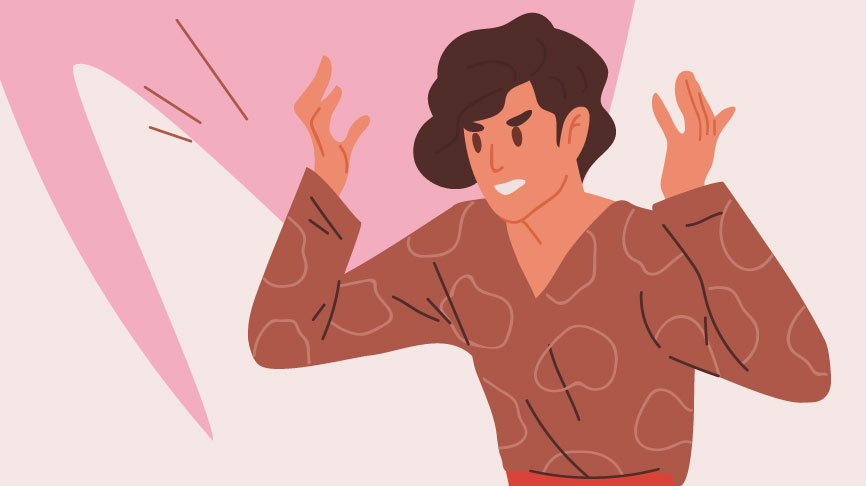PMS: Why You Feel So Crappy Right Before Your Period

This article was medically fact-checked by Consultant Obstetrician and Gynaecologist Dr. Shree Datta.
Ahh, good old PMS, or premenstrual syndrome. Those dreary days leading up to your period where the couch incessantly calls out your name, and naps become your best friend.
Sometimes these days make it nearly impossible to get anything done but snack and sleep, wondering when the crimson tide will make its debut on your clean sheets.
From a bloated belly, to nagging cramps, the discomfort and lethargy of PMS may leave you wondering what exactly is going on in your body.
So let’s explore just why you feel so crappy before your period, and how to navigate it.
Hormone Heavy
The main players when it comes to menstruation are the ovaries, hypothalamus, and pituitary gland. Together, these heavy hitters dictate the production and secretion of reproductive hormones.
We all know about periods- that’s why we’re here right? The first day of bleeding is the start of your “cycle”. About 14 days after that is when ovulation occurs and you enter the luteal phase. Usually about two weeks after your period- although this can vary.
PMS comes in the luteal phase of your cycle.
When an egg released during ovulation goes unfertilized, progesterone levels begin to fall. This powerful hormone controls a lot in your body, including chemicals in the brain such as serotonin. A drop in this so-called “happy chemical” is a contributing factor in the emotional swings that can come before your period.
Progesterone also aids in relaxation and sleep. So when levels of it drop, you may feel anxious and irritable.
On the other hand, high levels of estrogen, sometimes called “estrogen dominance”, can increase symptoms of PMS.
For the most part, the two main theories around PMS, revolve around sensitivities to progesterone and progestins, along with the neurotransmitter (Serotonin and GABA) theory.
Don’t Forget Your Vitamins!
Maybe you’ve been able to cut some of the previously mentioned culprits, but are still experiencing before period crappiness. It may be time to add something in.
Vitamins D and B (especially B6), as well as calcium and magnesium, have all been found to be essential to hormonal balance and neurotransmitter synthesis- aka the creation of brain chemicals. Eating foods rich in these nutrients, and using high-quality supplements may be the trick you’ve been looking for.
Regulation and Prevention
When it comes to PMS, it matters what you do throughout your whole cycle, not just while you’re feeling uncomfortable. Regular exercise and movement can help improve symptoms of PMS before they even start.
If you consistently find yourself down in the dumps before your period, it may be helpful to seek counseling or CBT, or Cognitive Behavioural Therapy.
Environmental Uh Oh
One of the reasons so many people are experiencing symptoms related to high levels of estrogen are because of lifestyle and environmental factors.
Certain chemicals in plastics, cosmetics, cleaning products, and plenty of other things we use in our daily lives, have high levels of BPA, and other compounds that negatively affect our hormone levels.
Switching to toxin-free products, and reducing plastic (especially when it comes to your food) may significantly improve PMS symptoms.
Sneaky Culprits
Let’s not forget about another key factor in your PMS journey- what you put in your mouth. Many of the things we eat on a daily basis can have a significant impact on PMS symptoms. Sneaky things like sugar, caffeine, and alcohol can all negatively affect your hormonal levels.
Cutting these out, or limiting them may improve your symptoms.
If you eat meat and other animal products, be sure to choose ones made from animals not treated with hormones. This may seem like common sense, but added hormones to your food, means added hormones to your body.
Stick to the basics here. Whole foods, organic preferred, with lots of fruits and veggies. Fiber is also crucial to your body’s ability to process estrogen. The food you eat not only impacts your hormones, but also your overall mood.
Turn That Frown Upside Down
Your overall mental and physical health have significant impacts on premenstrual symptoms. A high-stress lifestyle can throw hormones out of whack. The menstrual cycle is a direct reflection of your overall health.
Poor mental and physical health can affect menstruation, especially when it comes to any emotional side effects you may experience.
While it’s a lot easier said than done to be healthy and stress-free, doing what you can to help improve these areas of your life, will give you a smoother luteal phase, and overall menstrual cycle.
While some PMS symptoms are normal (and there is a wide range of normal), if they are seriously affecting your life and wellbeing, there are steps you can take to help make your cycle smoother.
Time For Reinforcements
Still feeling the pre-period bummers? It might be time to call for backup.
There are plenty of holistic practitioners that have spent years understanding the nuances of the female hormonal cycle, and how their modalities can help treat imbalances.
If you think you may need some extra support, try reaching out to a local acupuncturist, naturopathic doctor, or midwife. Some chiropractors also have knowledge in hormonal balancing and nutrition.
Get to Know Your Cycle
Although it may take a few months to see a pattern, developing a more intimate relationship with your cycle will allow you to plan around it, and also know when something isn’t right.
If you have the flexibility to, try scheduling meetings and deadlines when you’re not PMSing. Leave plans open-ended, and allow for plenty of alone time. Your bed and your cat may very well be your best friends this time of the month.
Shifts and Cycles
The menstrual cycle is a natural fluctuation of hormones- one that is constantly shifting. We’re not always going to be as energetic and motivated as other times, and much of that is due to how women’s bodies rhythmically work in cycles.
With so much societal pressure to constantly be creating and achieving, it’s an important reminder that resting and downtime are just as important to our well being and success, as doing and adventuring.
So if you’re not feeling so hot right before your period, respect your body’s needs. The reason you’re tired, is because you probably need rest, plain and simple.
Facts checked by:
Dr. Shree Datta
Dr. Shree Datta is a Consultant Obstetrician and Gynaecologist in London, specialising in women’s health including all menstrual problems such as fibroids and endometriosis. Dr. Shree is a keen advocate for patient choice, having written numerous articles and books to promote patient and clinician information. Her vision resonates with INTIMINA, with the common goals of demystifying periods and delivering the best possible care to her patients
Written by:

Natasha (she/her) is a full-spectrum doula and health+wellness copywriter. Her work focuses on deconstructing the shame, stigma, and barriers people carry around birth, sex, health, and beyond, to help people navigate through their lives with more education and empowerment. You can connect with Natasha on IG @natasha.s.weiss.



